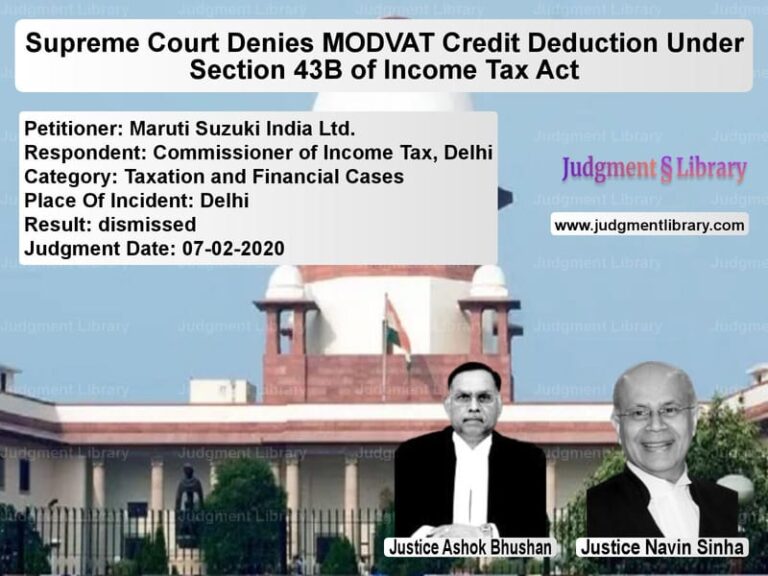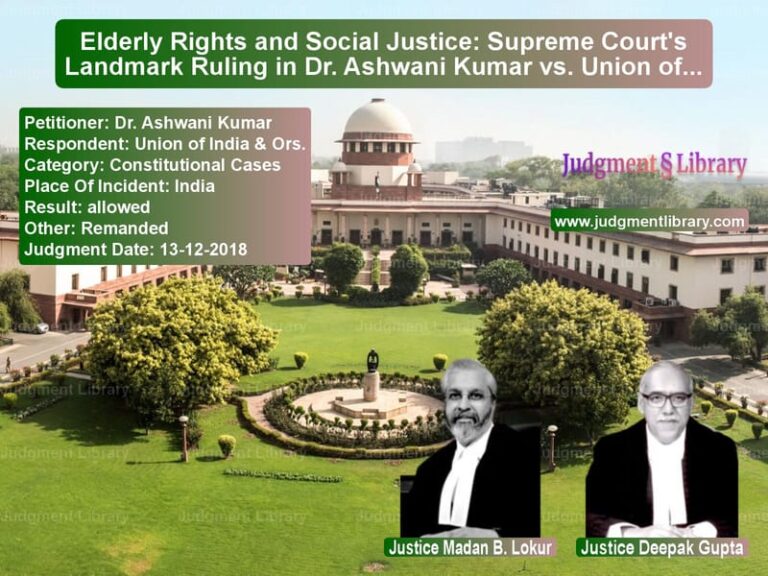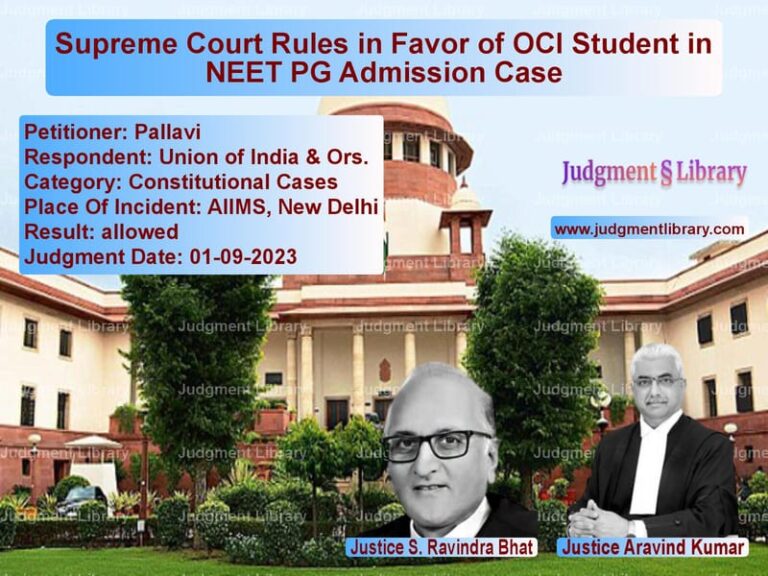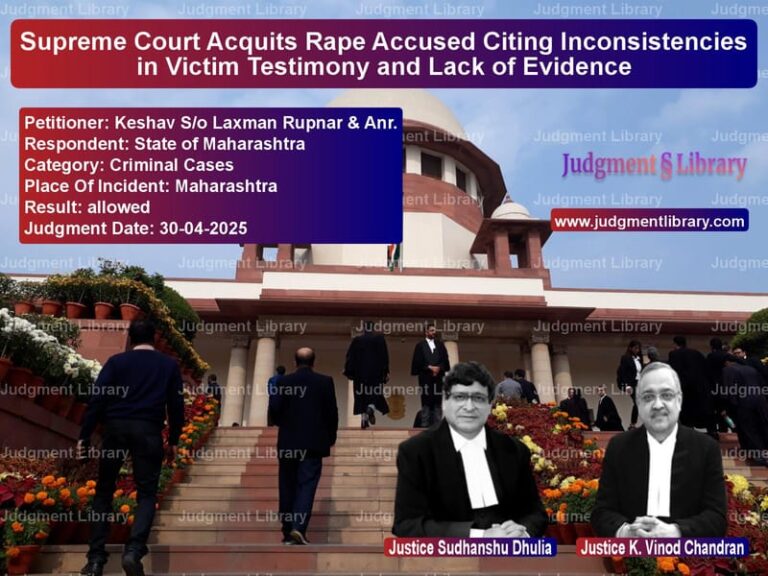Amazon vs. Future Retail: Supreme Court Rules on Emergency Arbitration in India
The case of Amazon.com NV Investment Holdings LLC vs. Future Retail Limited & Ors. is a landmark judgment in the realm of arbitration and corporate law. The dispute centered on the enforceability of an Emergency Arbitrator’s award under the Arbitration and Conciliation Act, 1996, and whether such an award could be considered binding under Indian law.
Two critical legal questions were presented before the Supreme Court:
- Whether an “award” delivered by an Emergency Arbitrator under the SIAC (Singapore International Arbitration Centre) Rules could be considered an order under Section 17(1) of the Arbitration and Conciliation Act, 1996.
- Whether an order passed under Section 17(2) of the Arbitration Act, enforcing the Emergency Arbitrator’s award, was appealable.
Background of the Case
The dispute originated from a commercial agreement between Amazon.com NV Investment Holdings LLC (Amazon) and Future Retail Limited (FRL), a major Indian retail chain. Amazon had invested approximately Rs. 1431 crore in Future Coupons Pvt. Ltd. (FCPL), a company controlled by the Future Group. This investment was based on contractual rights granted to FCPL regarding Future Retail’s retail assets.
However, in August 2020, Future Group announced a transaction with Reliance Retail Limited, a subsidiary of Reliance Industries Limited (RIL), which Amazon claimed was in violation of the agreements between Amazon, Future Coupons, and Future Retail.
Amazon initiated arbitration proceedings under the SIAC Rules and obtained an Emergency Arbitrator’s interim order on October 25, 2020, restraining Future Retail from proceeding with its deal with Reliance. However, Future Group continued with the deal, arguing that the Emergency Arbitrator’s order was not binding under Indian law.
Petitioner’s Arguments
Amazon, represented by Senior Counsel Gopal Subramanium, argued:
- The Emergency Arbitrator’s order was binding and enforceable under Section 17(1) of the Arbitration Act.
- The Arbitration Act allows parties to choose institutional rules, such as the SIAC Rules, which include provisions for Emergency Arbitration.
- Future Group had agreed to the SIAC Rules, which clearly allow an Emergency Arbitrator’s order to be binding.
- The Delhi High Court’s ruling enforcing the Emergency Arbitrator’s order under Section 17(2) should be upheld.
Respondent’s Arguments
Future Retail Limited, represented by Senior Counsel Harish Salve, countered:
- Emergency Arbitration is not recognized under Indian law.
- The Arbitration Act defines an arbitral tribunal as a panel of arbitrators, not a single Emergency Arbitrator.
- Section 17(1) does not cover Emergency Arbitrators, and thus, their orders are not enforceable under Section 17(2).
- The Delhi High Court had erred in enforcing the Emergency Arbitrator’s order.
Court’s Observations
The Supreme Court analyzed the provisions of the Arbitration Act and found that party autonomy is the foundational principle of arbitration. It referred to international arbitration rules and noted that Emergency Arbitrators are widely accepted in global arbitration jurisprudence.
The Court made the following key observations:
- “Party autonomy is fully recognized by the Arbitration Act, and institutional rules chosen by the parties must be honored.”
- “An Emergency Arbitrator’s award, if provided for under institutional rules, is covered under Section 17(1) of the Arbitration Act.”
- “Section 17(2) of the Act enables enforcement of such orders, treating them as orders of the court.”
Final Verdict
The Supreme Court ruled in favor of Amazon, holding that:
- Emergency Arbitrators’ awards are valid and enforceable under Indian law.
- Orders passed under Section 17(2) are not appealable under Section 37 of the Arbitration Act.
- The Delhi High Court’s order enforcing the Emergency Arbitrator’s ruling was correct.
The Court set aside the Division Bench’s ruling, which had stayed the enforcement of the Emergency Arbitrator’s order, and reaffirmed the validity of institutional arbitration mechanisms.
Impact of the Judgment
This ruling has significant implications for arbitration in India:
- Recognition of Emergency Arbitration: Indian courts now recognize Emergency Arbitrators and their orders as binding under the Arbitration Act.
- Strengthening Institutional Arbitration: This decision reinforces India’s commitment to international arbitration standards and enhances investor confidence.
- Precedent for Future Disputes: Companies operating in India can now rely on Emergency Arbitrators in SIAC and other arbitration forums, knowing their orders will be enforceable in Indian courts.
This judgment marks a significant step in aligning India’s arbitration regime with international best practices, promoting efficiency, and reducing judicial intervention in arbitration matters.
Petitioner Name: Amazon.com NV Investment Holdings LLC.Respondent Name: Future Retail Limited & Ors..Judgment By: Justice R.F. Nariman, Justice B.R. Gavai.Place Of Incident: New Delhi, India.Judgment Date: 06-08-2021.
Don’t miss out on the full details! Download the complete judgment in PDF format below and gain valuable insights instantly!
Download Judgment: amazon.com-nv-invest-vs-future-retail-limite-supreme-court-of-india-judgment-dated-06-08-2021.pdf
Directly Download Judgment: Directly download this Judgment
See all petitions in Arbitration Awards
See all petitions in International Arbitration
See all petitions in Commercial Arbitration
See all petitions in Enforcement of Awards
See all petitions in Dispute Resolution Mechanisms
See all petitions in Judgment by Rohinton Fali Nariman
See all petitions in Judgment by B R Gavai
See all petitions in allowed
See all petitions in Quashed
See all petitions in supreme court of India judgments August 2021
See all petitions in 2021 judgments
See all posts in Arbitration and Alternate Dispute Resolution Category
See all allowed petitions in Arbitration and Alternate Dispute Resolution Category
See all Dismissed petitions in Arbitration and Alternate Dispute Resolution Category
See all partially allowed petitions in Arbitration and Alternate Dispute Resolution Category







